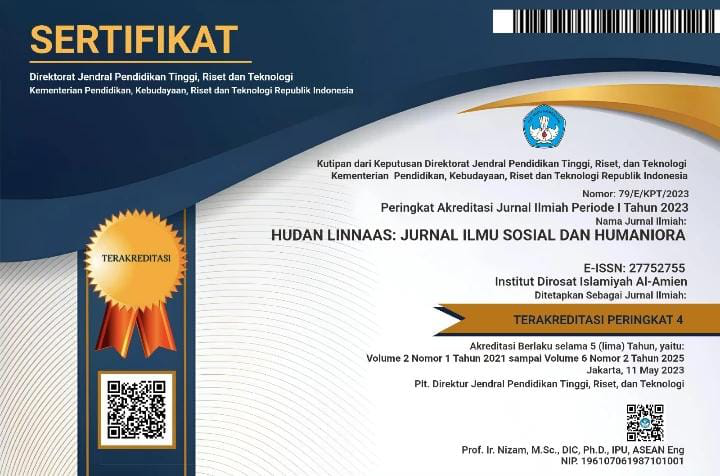FAMILY SOCIALISATION FUNCTION IN OUT-OF-SCHOOL CHILDREN
Abstract
The Wonosobo District Government has endeavored to tackle the problem of out-of-school children through the "Mayo Sekolah" program. However, not all children, including those in Jaraksari Urban Village, show interest in resuming their education. Various studies have shown that family factors contribute to children's decision not to attend school. This research seeks to explore the function of family socialization in out-of-school children by exploring their life experiences from the time they decide not to go to school to their plans. This qualitative research with a grounded theory approach was conducted using interviews, observation, and documentation. In-depth interviews were conducted with five primary informants of out-of-school children and five supporting informants in the form of informants' families. Observation was conducted by observing the activities of out-of-school children. Documentation was conducted by analyzing documents from Jaraksari Urban Village, the Education Office, and various relevant reading sources. The study results were analyzed using Spradley's data analysis technique, which consists of domain analysis, taxonomy analysis, component analysis, and theme analysis. Meanwhile, data validity was tested using source triangulation. The results showed that the conjugal family system influences the function of family socialization. Three variations of conjugal families become the place of growth of out-of-school children in Jaraksari Urban Village, namely families who live separately from their extended families, families who experience problems within the scope of the nuclear family, and families who live with extended families but remain independent in carrying out their respective functions.
Keywords
References
Antaranews. (2023). Menkeu: Anggaran pendidikan 2022 terealisasi Rp472,6 triliun. Retrieved from https://jatim.antaranews.com/berita/669339/menkeu-anggaran-pendidikan-2022-terealisasi-rp4726-triliun#:~:text=Jakarta (ANTARA) - Menteri Keuangan,triliun%2C dan pembiayaan Rp20 triliun.
Bappenas. (2015). Rancangan Teknokratik Rencana Pembangunan Jangka Menengah Nasional (RPJMN) 2020-2024. Kementrian Perencanaan Pembangunan Nasional, 2015–2019.
Bps.go.id. (2023). Angka Partisipasi Sekolah ( A P S ) 2020-2022. Retrieved from bps.go.id website: https://www.bps.go.id/indicator/28/301/1/angka-partisipasi-sekolah-a-p-s-.html
Bupati Wonosobo Provinsi Jawa Tengah. (2022a). Keputusan Bupati Wonosobo Nomor 420/285/2022. Wonosobo.
Bupati Wonosobo Provinsi Jawa Tengah. (2022b). Peraturan Bupati Wonosobo Nomor 57 Tahun 2022. Wonosobo.
Goode, W. J. (2004). Sosiologi Keluarga (6th ed.). Jakarta: Sinar Grafika Offset.
Ihromi, T. O. (2004). Beberapa Catatan Mengenai Pengkajian Keluarga dalam Masyarakat yang Berubah (2nd ed.). Jakarta: Yayasan Obor Indonesia.
Karim, E. (2004). Tinjauan Sosiologi Mengenai Perceraian. In Bunga Rampai Sosiologi Keluarga (2nd ed.). Jakarta: Yayasan Obor Indonesia.
Lidya Julita Sembiring. (2022). Anggaran Pendidikan 2022 Naik Jadi Rp 621 T, Buat Apa Saja? Retrieved from CNBC Indonesia website: https://www.cnbcindonesia.com/news/20220520153518-4-340537/anggaran-pendidikan-2022-naik-jadi-rp-621-t-buat-apa-saja
Malik, H. K., & Sumarno, S. (2016). Kepedulian orang tua terhadap pendidikan anak untuk menyelesaikan program wajar 9 tahun. Jurnal Pendidikan Dan Pemberdayaan Masyarakat, 3(1), 38. https://doi.org/10.21831/jppm.v3i1.8061
Monga, O. P., Monga, A., & Monga, O. P. (2015). Family and School Dropouts : A Socio-psychological Observation. American International Journal of Research in Humanities, Arts and Social Sciences, (2014), 2014–2017.
Muhammad Indra Haria Kurba. (n.d.). Menyoal Anggaran Pendidikan. Retrieved from Kementrian Keuangan website: https://anggaran.kemenkeu.go.id/in/post/menyoal-anggaran-pendidikan
Noviani, L., Budiarti, A. C., Tuhana, T., & Setyawati, M. (2023). Strategi Penanganan Anak Tidak Sekolah Di Kabupaten Sragen. Jurnal Litbang Sukowati : Media Penelitian Dan Pengembangan, 7(1), 92–103. https://doi.org/10.32630/sukowati.v7i1.379
Prameswari, E. (2004). Peran Keluarga dalam Pendidikan Taruna di Akademi TNI-AL (AAAL)-Surabaya, sebagai Satu Institusi Pendidikan Tinggi Bercirikan Total Institusi. In T. O. Ihromi (Ed.), Bunga Rampai Sosiologi Keluarga (2nd ed.). Yayasan Obor Indonesia.
Ridwan, R., Irawaty, I., & Momo, A. H. (2020). FAKTOR PENYEBAB ANAK PUTUS SEKOLAH (Studi di Desa Mapila Kecamatan Kabaena Utara Kabupaten Bombana). Selami Ips, 12(1), 62. https://doi.org/10.36709/selami.v12i1.10838
Ririk, R., Lilianti, L., & Mujiati, M. (2022). Faktor-Faktor Yang Menyebabkan Anak Putus Sekolah di SD Negeri Saponda Kecamatan Soropia Kabupaten Konawe. Jurnal Pendidikan Dan Pengajaran (JPP), 2(2), 112–122. https://doi.org/10.51454/jpp.v2i2.158
Sadya, S. (2022). Angka Partisipasi Sekolah Indonesia Cenderung Menurun pada 2022. Retrieved from data Indonesia.id website: https://dataindonesia.id/ragam/detail/angka-partisipasi-sekolah-indonesia-cenderung-menurun-pada-2022
Wonosobo, B. K. (n.d.). Angka Partisipasi Sekolah,Angka Partisipasi Murni,Angka Partisipasi Kasar 2020-2022. Retrieved September 1, 2023, from bps.go.id website: Angka Partisipasi Sekolah, Angka Partisipasi Murni, Angka Partisipasi Kasar 2020-2022%0A
DOI: 10.28944/hudanlinnaas.v4i1.1336
Refbacks
- There are currently no refbacks.

This work is licensed under a Creative Commons Attribution-NonCommercial-ShareAlike 4.0 International License.







.png)